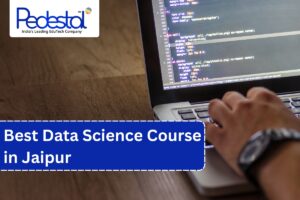Ever faced a technical interview at a top tech company, feeling your confidence drain as you stare at a seemingly simple coding problem? At Pedestal Techno World, India’s premier edtech company for corporate training and data science skilling, we’ve guided countless professionals through this experience.
After years of preparing students for roles at industry giants, our expert trainers have observed a clear pattern: candidates who excel at these interviews have mastered Data Structures and Algorithms (DSA). As we approach 2025, these fundamental skills have become essential differentiators in the competitive tech landscape.
Why DSA Knowledge Is Critical for Data Science Careers
Many professionals with strong statistical backgrounds underestimate the importance of DSA until they encounter technical interviews. Our corporate training programs emphasize these skills because:
- Efficient algorithms significantly reduce data processing time
- Technical interviews at leading companies invariably include DSA challenges
- Strong DSA skills demonstrate computational thinking that employers value
A recent Pedestal Techno World success story illustrates this perfectly. Arjun, a statistics graduate who joined our comprehensive Data Science Course, struggled with basic programming initially. Through our structured curriculum and hands-on practice, he mastered critical DSA concepts and secured an internship at Amazon within three months.
The 8 Essential DSA Skills Top Companies Evaluate
Based on feedback from our industry partners and the experiences of successful graduates from our data science skilling programs, these eight DSA topics consistently appear in technical assessments:
-
Arrays: Fundamental Building Blocks
Arrays form the foundation of data structure knowledge. Top companies often begin interviews with array manipulation problems to assess baseline coding ability.
During our corporate training sessions, we emphasize two-pointer techniques and in-place operations that optimize memory usage. These approaches have helped numerous Pedestal students solve common interview problems, such as finding pairs that sum to target values.
In real-world data science applications, efficient array handling improves everything from data cleaning to feature preprocessing for machine learning models.
-
Strings: Essential for Text Processing
For professionals working with natural language processing or text analytics, string manipulation skills are indispensable.
Our advanced Data Science Course covers sliding window techniques and pattern matching algorithms that frequently appear in technical assessments. Google and other NLP-focused companies regularly test candidates on substring operations and optimization problems.
Pedestal Techno World’s hands-on training approach includes weekend projects where students optimize text processing pipelines using efficient string algorithms.
-
Linked Lists: Core Memory Management
Linked lists reveal a candidate’s understanding of memory allocation and pointer operations – skills that distinguish experienced developers from novices.
Microsoft and similar enterprise-focused companies frequently ask candidates to manipulate linked structures. Our corporate training programs include dedicated sessions on linked list operations, helping professionals understand not just how to solve these problems, but why certain approaches are more efficient than others.
These concepts translate directly to handling streaming data and building custom data structures for specialized applications.
-
Stacks & Queues: Critical Data Flow Components
These fundamental structures power numerous systems from browser history to task scheduling.
Amazon’s technical assessments often include implementing complex data structures using stacks and queues as building blocks. At Pedestal Techno World, we emphasize practical applications of these concepts through real-world examples that resonate with working professionals.
Our industry-aligned curriculum ensures that students understand how these abstractions support critical systems like event processing and asynchronous operations.
-
Trees: Hierarchical Data Representation
Tree structures separate intermediate data scientists from advanced practitioners, especially in algorithm-heavy domains.
Our specialized skilling programs demonstrate how hierarchical structures support everything from decision trees in machine learning to efficient search operations. Companies like Fractal Analytics specifically assess candidates on binary tree implementations and traversal algorithms.
Pedestal Techno World’s placement-focused training helps students connect theoretical tree concepts to practical applications in data organization and search optimization.
-
Hashing: Performance Optimization Techniques
Hash-based data structures deliver the performance that modern applications demand, particularly when processing large datasets.
Our Data Science Course curriculum covers hash function design, collision resolution, and optimization strategies that frequently appear in technical interviews. Airbnb and similar data-intensive companies often test candidates on problems requiring efficient lookup implementations.
Students in our corporate training programs learn to apply these concepts to database optimization and feature engineering tasks that directly impact business performance.
-
Sorting & Searching: Algorithmic Foundations
Understanding when to apply specific sorting and searching algorithms demonstrates algorithmic maturity that employers value.
Microsoft and other enterprise software companies regularly assess candidates on modified search problems that require adapting standard algorithms. At Pedestal Techno World, we emphasize not just implementation details but the decision-making process behind algorithm selection.
These skills directly benefit data science professionals who must optimize analytical pipelines for performance and accuracy.
-
Dynamic Programming: Advanced Problem-Solving
Dynamic programming represents the pinnacle of algorithmic thinking, testing a candidate’s ability to break complex problems into manageable subproblems.
Google and AI-focused companies often present optimization challenges that require DP approaches. Our advanced skilling modules guide students through the step-by-step process of recognizing and implementing DP solutions, starting with simple recursion and advancing to optimized approaches.
These techniques transfer directly to optimization problems in machine learning and predictive modeling.
How Leading Companies Evaluate DSA Skills in 2025
- Google: Emphasizes tree-based algorithms for recommendation systems, often requiring candidates to implement custom traversal methods
- Amazon: Focuses on array manipulation and hash table implementations for e-commerce optimization problems
- Microsoft: Evaluates stack implementations and search modifications that mirror their enterprise software needs
- Analytics firms like Fractal: Test practical applications of tree structures for customer behavior modeling
Pedestal Techno World’s Proven Approach to DSA Mastery
As India’s best edtech company for professional skilling, we’ve refined our approach to teaching these critical concepts:
- Our Data Science Course integrates DSA concepts with practical projects, helping students implement recommendation systems using appropriate data structures
- Industry-aligned internship programs provide real-world experience applying these algorithms to business problems
- Mock interview sessions conducted by industry professionals prepare candidates for actual assessment conditions
- Placement assistance connects qualified students with our extensive network of hiring partners
Our comprehensive approach to data science skilling ensures that graduates are prepared not just for interviews but for the actual demands of professional roles.
Effective Strategies for DSA Proficiency
Based on years of corporate training experience, we recommend these approaches:
- Progressive learning: Begin with fundamental structures and gradually advance to complex algorithms
- Consistent practice: Regular, focused sessions yield better results than occasional intensive study
- Applied learning: Connect abstract concepts to specific data science applications
- Collaborative study: Form study groups to enhance understanding through teaching others
- Balanced approach: Maintain sustainable study habits that prevent burnout
Your Path to Data Science Success
DSA proficiency is not merely interview preparation—it fundamentally enhances your capabilities as a data scientist. Whether your goal is joining a technology leader like Google or an analytics pioneer like Fractal, these skills provide a competitive advantage.
At Pedestal Techno World, our specialized Data Science Course and corporate training programs have helped hundreds of professionals transform their careers. Our industry-recognized skilling programs combine theoretical foundations with practical implementation, creating job-ready candidates.
Ready to elevate your technical capabilities? Explore our comprehensive Data Science Course or inquire about our internships in jaipur . Let Pedestal Techno World, your trusted edtech partner, guide your professional development journey.
Have questions about specific DSA concepts or how they apply to your data science career? Connect with our expert trainers today!




Great breakdown of why DSA is still so relevant for data science roles in 2025. I especially agree with the emphasis on dynamic programming—it’s often overlooked but frequently shows up in interviews at top-tier companies. Would love to see more examples or problem sets tied to real-world data science applications in future posts!
It’s easy to overlook DSA when focusing heavily on stats or ML models, but this post is a solid reminder that interviewers often use these concepts to test problem-solving skills. Arrays and dynamic programming especially seem to pop up in real interviews more than expected.
DSA Comment GenerationGreat breakdown of why DSA remains such a crucial part of data science interviews, even as the field evolves. I especially liked the emphasis on lesser-highlighted topics like linked lists and dynamic programming—these often trip up candidates who focus only on high-level concepts. Curious to know if you’ve noticed any shift in emphasis on certain DSA topics from 2024 to 2025?
Great breakdown of core DSA topics! I especially appreciate the emphasis on dynamic programming—it’s one of the most overlooked yet powerful skills in data science interviews. Would love to see future content that links these DSA topics to real-world data science case studies.
It’s so true that many data science professionals overlook DSA skills, focusing only on stats or ML. I’ve seen firsthand how a solid grasp of concepts like hashing and dynamic programming can be a game-changer during technical interviews.
Great breakdown of howDSA Blog Comment Creation core DSA topics directly map to real-world challenges in data science roles. I’ve seen many candidates focus heavily on modeling or tools, only to struggle in interviews that dig into algorithmic thinking. Highlighting topics like dynamic programming and hashing as differentiators really hits home for anyone aiming for top-tier roles.